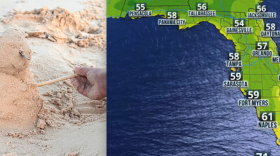President Trump assailed the World Health Organization on Tuesday, and indicated that he will consider putting a hold on funding it.
In a media briefing at the White House, Trump twice stated that the United States funds the majority of the organization's budget. According to the WHO, the United States provided 14.67% of its funding in 2018-2019.
The WHO has been the most prominent global organization leading the strategy to stem the spread of the novel coronavirus.
But on Tuesday, Trump criticized the WHO as slow to respond to the crisis, and repeatedly said the organization has been "China-centric." He complained that the WHO "receives vast amounts of money from the United States" and that the organization "called it wrong."
"They could have called it months earlier," he said. "They would have known and they should have known and they probably did not. So we'll be looking into that very carefully."
Trump at one point said "we're gonna put a hold on money spent to the WHO," before backtracking later in the briefing and saying "we're going to take a look at it."
Trump was asked what he meant by calling the WHO "China-centric."
"I don't know, they seem to come down on the side of China," Trump replied. "'Don't close your borders to China,' they don't report what's really going on. They didn't see it, and yet they were there, they didn't see what was going on in Wuhan. They didn't see it. How do you not see it? They didn't report it. They must have seen it, but they didn't report it."
The WHO has opposed travel bans, mainly due to the economic damage they cause.
The U.S. is the single largest contributor to the WHO. Its assessed contribution is 22% of the total members' assessed contributions. The U.S. pays considerably more than the assessed contributions in additional voluntary contributions. That 22% assessed contribution has been stable for many years, but the voluntary contributions have fluctuated depending on health crises and U.S. political priorities.
The WHO is funded not only by nations, but also nonprofit organizations, foundations, companies, universities and governmental alliances. After the U.S., the next three largest WHO funders in 2018-2019 were the Bill & Melinda Gates Foundation, the GAVI Alliance, and the United Kingdom.
Copyright 2020 NPR. To see more, visit https://www.npr.org. 9(MDAyMTYyMTU5MDEyOTc4NzE4ODNmYWEwYQ004))









